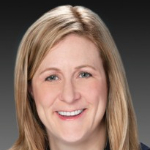 The industry event anyone in secured finance attends now celebrates its 77th year. SFNet is set to make the Arizona convention a memorable one. Click below to register.
The industry event anyone in secured finance attends now celebrates its 77th year. SFNet is set to make the Arizona convention a memorable one. Click below to register.

Katherine Bell
Partner, Paul Hasting LLP
Biography:
Katherine Bell is a partner in the Finance and Restructuring practice of Paul Hastings and is based in the firm’s Orange County office. Katherine was a co-founder of the Firm’s Alternative Lender and Private Credit group.
Her practice focuses on complex commercial and corporate finance transactions. Katherine regularly represents banks, alternative lenders (including insurance companies, funds, and specialty finance companies), and other lenders in credit facilities (both cash flow and asset-based), acquisition financings, structured financings, and other leveraged finance transactions that span the capital structure. Her financing matters frequently occur in conjunction with leveraged buyouts, restructurings, or recapitalizations, and involve both domestic and global businesses across a broad range of industries. The structured nature of the positions her clients take in the capital structure necessitate sophisticated intercreditor advice. Katherine is well versed in negotiating intricate intercreditor relationships on behalf of her clients in both senior and junior positions, including 1st lien/2nd lien transactions, split collateral arrangements, and unitranche transactions.
Katherine recently co-authored Asset-Based Lending: A Practical Guide to Secured Financing (Practising Law Institute, 8th ed. 2015), which is generally considered to be the definitive treatise on asset-based lending.
What advice would you offer to women just starting out in the industry?
Take ownership of your professional development and actively influence the direction of your career. While top performance is a baseline requirement for success, just putting your head down and throwing yourself into your work is often not enough to achieve professional success. Your goals and milestones may change along your path forward. It is critical to periodically take time to reflect on your performance, your trajectory, and your goals and to redirect or adjust course in response. This exercise will better position you to proactively influence the direction of your career, instead of simply reacting as things come your way.
Remember that you have the reins – it is your responsibility to take your career in the direction you want to go. Gather information, explore opportunities, and make it known what you are trying to achieve.
Playing an active role in your professional development will positively impact the satisfaction you find in your work and will position you for success.
What do you know now that you wish you knew in the beginning of your career?
It is okay to say no. This is an important lesson and one that I still struggle at times to implement. While I think it is important to consider many of the opportunities that you will encounter along your professional path, sometimes the best course of action is to decline an opportunity. Be thoughtful, consider what is at stake, and explain your rational when appropriate. Sometimes declining an opportunity is necessary in order to address other priorities. Also, sometime you have to walk away from one opportunity in order to make room for new ones.
What kind of role has mentoring and/or sponsorship played in your career?
Mentoring and sponsorship have been absolutely critical to my professional development. I’ve been blessed with a number of incredible relationships in that vein over the course of my career, and many continue to play important roles in my success today.
In my experience, no one achieves success alone. I think the most important role that mentors and sponsors have played for me has been to push me to perform outside of my comfort zone in order to bring new challenges and opportunities within my reach. My mentors have also acted as sounding boards as I’ve considered how to approach challenges and opportunities. Having access to their experience and perspective has been invaluable.
What do you think the industry could do to attract and retain the best and the brightest today?
I think that one of the biggest challenges that this industry faces is that it is viewed as very conservative and traditional. Many newer professionals today are looking for a role that excites them – something dynamic and cutting-edge where they are making a difference. The commercial finance industry offers countless exciting opportunities around the globe and has enormous impact on the communities around us, but we have to better market all of that in a targeted way to get the attention of young professionals and to address their priorities today.
77th Annual Convention
 The industry event anyone in secured finance attends now celebrates its 77th year. SFNet is set to make the Arizona convention a memorable one. Click below to register.
The industry event anyone in secured finance attends now celebrates its 77th year. SFNet is set to make the Arizona convention a memorable one. Click below to register.
